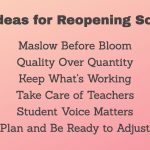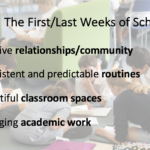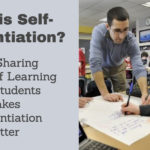On Friday, March 14, 2025, a group of thoughtful school leaders gathered in Manchester, NH for a one-day workshop. The goal was to think about how to support teachers’ physical and emotional health to rekindle teachers’ professional fires.
We began
Last week I had the privilege of teaching two online workshops for teachers about getting ready for the upcoming school year. They were both so much fun! We played games that teachers can use with their students (either in person
“I’m on the edge of a breakdown. I’m pouring everything I have into my students, and it doesn’t seem to be enough. My principal keeps telling me I need to take care of myself, but she never gives me time
What might schools look like in the fall?
We can learn from schools that have already welcomed children back to school.
In the United States, many of us (teachers, parents, and students) are filled with anxiety about what the
This has been a spring that few of us anticipated. As we now look to the end of the year, many of us are aching for our favorite end-of-the-year moments—that final awesome read-aloud, the class gathering with families, the spring
Remember those days in the classroom when you thought, “I have friends who work from home. Wouldn’t that be nice?” Well, here you go! COVID-19 is giving you a chance to try it out.
No doubt, there are some upsides
A school-based content coach wrote to me because her K-5 school is considering moving toward content specialization. This means that at each grade level, teachers would focus on specific content areas and kids would change classes throughout the day. She
The Dilemma
You want to offer students choices about what they learn or how the learn it. Engagement would be higher and you could offer differentiated options to meet the needs of various learners. However, you’re saddled with a scripted
It seems to be more and more common for teachers to give presentations to adult audiences. Whether it’s sharing with parents at an open house night, making a persuasive speech at a school board meeting, facilitating part of a faculty
Kids who completely disconnect from all literacy and math during the summer may experience the “summer slide.” They return to school in the fall rusty–with little school stamina. They may even lose academic ground that they gained the previous year.
We all know the importance of the first six weeks of school. We build positive relationships with students and a strong sense of community membership within our classes. We establish consistent and predictable routines to help students feel safe and allow them
What if the best recipe for creating successful schools was developing relaxed, safe, and joyful ones? What if the key to raising achievement (even as measured by standardized tests) was to have students engage in authentic, student-driven, choice-based, and fun
I wish I could teach social and emotional skills, but there’s too much pressure to teach academics—I just don’t have time!
As I work with teachers in schools across the United States, I often hear some version of this statement.
How Sharing Control of Learning with Students Makes Differentiation Better
Too often, differentiation (especially when it’s called differentiated instruction) places nearly all of the responsibility and work for differentiation in the teacher’s court. This often results in teachers feeling like
One of the most exciting and enjoyable ways to differentiate learning for students is to lead them through a process of independent research. When students get to dig deeply into something they’re passionate about, they have the drive and stamina
In response to a recent Well-Balanced Teacher Facebook post about teacher burnout, a teacher quipped: “When it’s only a month into the school year and people already feel burnt out, stressed, and overwhelmed, there is a problem!” So why is
The first weeks of school are winding down. The weather is cooling off and academic work is heating up. This is a great time to reflect on the relationships you’re building with your class. How well do you know your
Teachers are burning out at an alarming rate. Overworked and saddled with increasingly complex and overwhelming responsibilities, not to mention more challenging students and families, many teachers are suffering from exhaustion and chronic stress. Not surprisingly, this has a profound
Many schools are working hard to help promote a growth mindset in their students. I recently facilitated a learning session with a group of teachers that I’d like to pass along. It is a simple activity that yielded some powerful
We all know the power of positive community in the classroom. When students feel valued, are known for their strengths, enjoy coming to school, and feel safe and supported, they are more ready to engage in great learning. Not surprisingly,
Emily lay curled up under her covers long after the alarm clock had woken her up. Her mother came into her room. “Emily! You need to get up! It’s the first day of school and it’s time to get going!”
In my first two years as a classroom teacher, I used an incentive system to try and motivate and manage students. At each cluster of four student desks, there was a plastic dish. When groups were working well, paying attention,
“I went to a workshop on active learning, and we just sat and listened all day!”
“I attended a ‘differentiated instruction’ seminar, and we all did the same thing at the same time!”
“Why can’t we ever get professional development
(This post was originally published on edCircuit.com.)
“Have you ever noticed that a third year teacher and a 30-year teacher have the same job description?”
This question, posed to me a while back by a colleague, seems particularly important in













